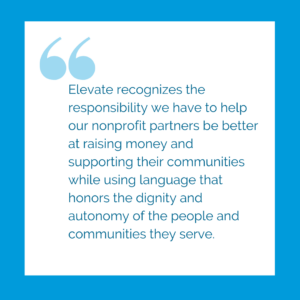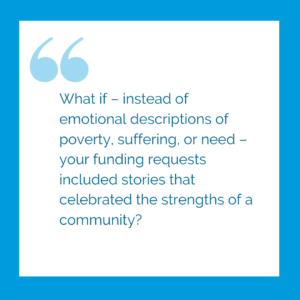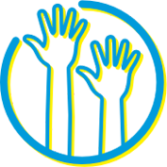Earlier in the year, I interviewed Brian Rosenbaum about how his professional training as a social worker and his personal DEI journey have enhanced his ability to fundraise for nonprofits and engage with major donors. During our Q&A, he emphasized the importance of ethical storytelling, which he defined as:
(1) Truthfully representing stories and situations in a way that educates the audience about the systemic and structural issues that challenge people; and
(2) Seeing the client as the teacher and the expert on their own experiences, with both strengths and struggles.
As a fundraising firm, Elevate recognizes the responsibility we have to help our nonprofit partners be better at raising money and supporting their communities while using language that honors the dignity and autonomy of the people and communities they serve.
The Origins of the Ethical Storytelling Movement – Ensuring Stories Do No Harm
 Stories—whether shared verbally, in writing, or through images—have the power to move people to take action. But with this potential to persuade, there is also a high risk of incorporating bias into narratives. Storytellers have the power – whether intentional or not – to inflict harm on the people who are the subjects of their stories.
Stories—whether shared verbally, in writing, or through images—have the power to move people to take action. But with this potential to persuade, there is also a high risk of incorporating bias into narratives. Storytellers have the power – whether intentional or not – to inflict harm on the people who are the subjects of their stories.
When this happens in fundraising, stories can become “transactional”—trading on constituent “suffering” for contributions. If you’ve ever written a grant or a donor appeal letter, you may have been tempted to “tug on the heartstrings” of your reader; in doing so, there is a real risk of telling a story that robs your subject of their dignity.
But there is a different way to originate and tell stories! What if—instead of emotional descriptions of poverty, suffering, or need—your funding requests included stories that celebrated the strengths of a community? What if stories could elevate rather than objectify, and thereby hew closer to the ostensible values and missions of a social-impact organization? It is out of this strength-based rather than deficit-based approach that Rachel Goble, the former CEO The Freedom Story, along with her friends and contacts, brought forward the ethical storytelling movement, along with a dedicated website, EthicalStorytelling.com.
Ethical Storytelling Resources
 On the EthicalStorytelling.com site, you can find a set of six underlying values, an ethical storytelling pledge, and a collection of resources to guide the storytelling practices of your organization.
On the EthicalStorytelling.com site, you can find a set of six underlying values, an ethical storytelling pledge, and a collection of resources to guide the storytelling practices of your organization.
The pledge urges storytellers to focus on “the HOW, not only the WHAT” of the stories that we encounter—meaning that the process of collecting stories is equally as important as the ultimate content of the stories that are shared. Among others, the pledge includes the commitments to:
- Always put people first.
- Uphold the dignity of constituents through empowering imagery and messages that motivate engagement and inspire hope.
- Truthfully represent a situation or story to educate audiences of the realities, complexities, and nuances of the issues for which you advocate.
- Avoid the use of images, footage, or words that sensationalize or stereotype a person or a situation.
- Ask for feedback from constituents, and incorporate this feedback into the final story.
- Not tell the story, despite the resources invested, when the story cannot be told with the integrity of this pledge.
- Commit to uphold integrity in storytelling and messaging.
The site’s downloadable resources include a child protection policy, a media consent form, and guidance on the use of a victim’s images—valuable tools for any nonprofit organization that wishes to share the stories of the people they serve.
The ethical storytelling approach is aligned with best practices in grant writing and storytelling that employ people-first and strengths-based language. People-first language is language that literally puts the person first. For example, using “a person with diabetes” rather than “diabetic person” when referring to an individual. This framework originated with the disability rights movement and the People with AIDS movement. It has since been reflected in the Americans with Disabilities Act (ADA) and the Individuals with Disabilities Education Act (IDEA).
Keep an eye on this space for more resources on this topic, including examples of Elevate partners that are skillfully applying the principles of ethical storytelling in their work. And for more resources on storytelling, check out Elevate’s previous articles on Using Empowering Language and Inclusive Writing strategies in grants.
About the Author:

Johnisha Levi










 Stories—whether shared verbally, in writing, or through images—have the power to move people to take action. But with this potential to persuade, there is also a high risk of incorporating bias into narratives. Storytellers have the power – whether intentional or not – to inflict harm on the people who are the subjects of their stories.
Stories—whether shared verbally, in writing, or through images—have the power to move people to take action. But with this potential to persuade, there is also a high risk of incorporating bias into narratives. Storytellers have the power – whether intentional or not – to inflict harm on the people who are the subjects of their stories.  On the EthicalStorytelling.com site, you can find a set of six underlying values, an
On the EthicalStorytelling.com site, you can find a set of six underlying values, an 




